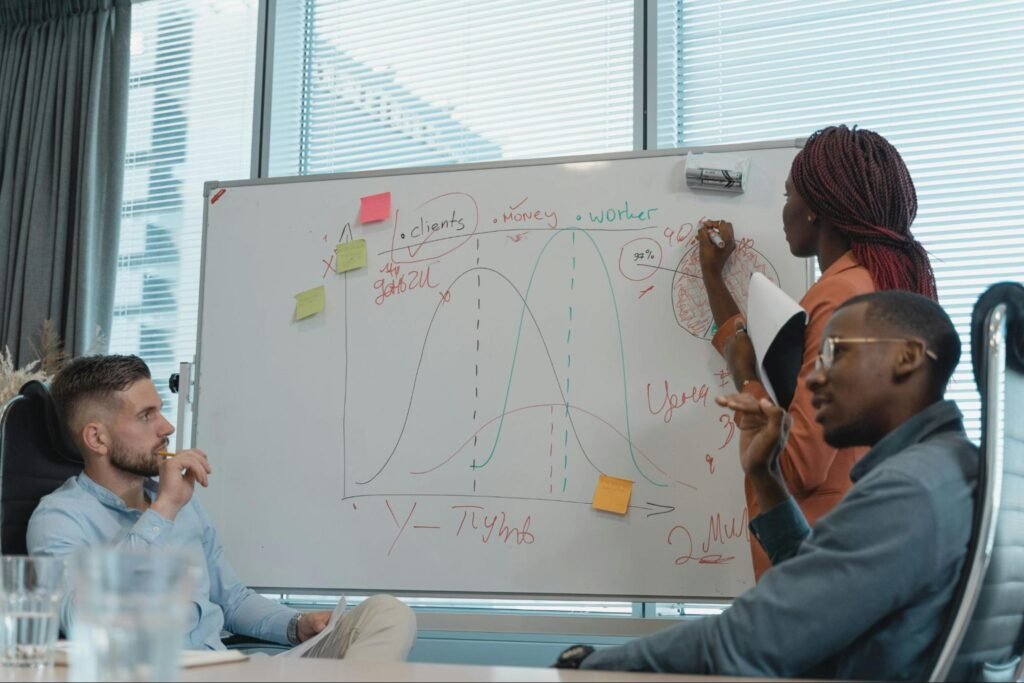
Corporate leaders and managers look to be on top of this fast paced and highly competitive environment. Your best performance, boosting your career, having better leadership skills, and dealing with difficult situations in business can all improve, and even transform, with the right executive coach.
However, finding a suitable coach is not only about what is stated on the coach’s resume, but it is also important to connect with the coach regarding your your specific goals and objectives. In this blog, I’ll highlight the key factors in choosing the best executive coach for you, and the way this decision can influence your career path.
Understanding Your Coaching Needs
Before speaking to an executive coach, the initial step is to clarify what you want. The more explicit your objectives are, the simpler it becomes to identify the appropriate coach.
Short-Term Professional Goals
Do you want a promotion, help with a difficult project, or to make a crucial business move? These are the short-term objectives that often require immediate attention. A skilled executive coach guides you through the process of clarifying your objectives, and then provides you with immediate actions that result in high impact.
Besides this, the appropriate coach will empower you to figure out and learn from your strengths and weaknesses.
Before searching for an executive coach, one must first clearly define their objectives. The more specific you are in your goal setting, the more likely you will be to discover a suitable coach.
This targeted method guarantees that you’re not just going through the motions, but instead developing in ways that will be taken into account in your professional and personal life.
Long-Term Professional Goals
Think about what you want your future to look like. A coach who has the knowledge of the big picture of your career can assist you in drawing a roadmap with tactics to realize your vision.
A coach with a solid leadership background can assist you in mastering the subtleties of executive presence, influence, and decision-making. They can help you build the necessary attitude and competence to lead at the highest level so that you are not only ready for the next role, but also able to succeed in it.
Identifying Your Goals and Objectives
- Clearly define what you want to achieve through coaching.
- Focus on the specific goals of improving team dynamics, enhancing productivity, and mastering leadership.
- Collaborate with your coach to set clear and achievable targets.
- Make sure that your goals and your coach’s approach are aligned.
- Set up metrics such as KPIs or feedback to track your progress.
- Regularly track your progress to remain accountable.
- Use insights from tracking to identify what’s working and make necessary adjustments.
- Celebrate wins and milestones along the way.
Specific Areas for Development
The very first thing a potential executive coach brings to the table is the ability to address your personal development needs, especially in the areas where you want to grow. This means not only being aware of your strengths and limitations, but also being ready to tackle personal challenges that could be affecting your work.
Strengths and Limitations
Before one can concentrate on their strengths during coaching; it may be fundamental that they first identify areas of improvement. When one comprehends their capabilities, they can assess, improve, and achieve greater success. Simultaneously, with the help of a coach, you can come up with techniques that will help overcome obstacles you’re currently facing.
Personal Challenges
Your job performance can be seriously affected by personal obstacles such as managing stress, managing work and life, or enhancing self-esteem. The coaching process deals with these problems and works to overcome them.
Holistic Development
The best coaching includes more than just sharpening of professional competencies; it also focuses on personal development. This includes attributes like emotional agility, as well as fortitude and flexibility in thought and action. By emphasizing holistic growth, your coach can guide you into becoming a better manager, as well as a balanced and satisfied individual who is ready for whatever comes their way.
2. Executive Coaching vs. Personal Coaching
As an executive coach, I bring a holistic approach to my methodology and clients. My executive coaching experience involves working with Fortune 100 companies, senior executives, CEOs, VPs, and Directors. My background is in organizational change management, where I managed enterprise-wide changes and was responsible for the workforce’s adoption of the changes and the overall culture of the organization. That said, although I have a business-focused background, my approach as an executive coach also includes the personal side. I believe that work and life are two sides of the same coin. How you show up in one, impacts the other. In my experience, addressing both makes the executive a better leader and overall person.
Below is a traditional explanation of the differences between executive coaching and personal coaching. As explained above however, I focus on both with my clients I coach one-on-one.
Executive Coaching
- Business-Centric Focus: The end goal of executive coaching is to develop executives professionally. It is all about the improvement of leadership qualities, refining decision-making, and making the organization operational.
- Organizational Impact: The best executive coach will assist not only in your progress but will also the overall team and organization in a positive way.
- Leadership Skills: Center on the development of skills that are crucial for your position in the organization. Examples of them are strategic thinking, conflict resolution, and effective communication.
Personal Coaching
- Holistic Approach: Personal coaching makes a deeper dive into your personal life, dealing with issues like self-awareness, emotional intelligence, and managing work and life.
- Personal Fulfillment: The desired outcome is often the attainment of a more fulfilling life, which in turn positively affects your work performance.
- Work-Life Integration: This kind of coaching emphasizes dealing with personal issues that may have affected your work and ensuring that your development is all-inclusive.
3. Characteristics to Seek in an Executive Coach
Finding the right executive coach means selecting someone with a working style and personality that resonates with you.
Experience and Expertise
- A coach who is not only skilled, but has many years of experience as a coach can offer valuable insights and comprehend the set of problems you deal with.
- Search for a coach who has proven his/her skills based on the successful results, the testimonials of past clients, and a systematic methodology.
Communication Style
- The ability to speak clearly and to give concise directions is of utmost importance. A coach you are working with should be a person who can express thoughts and give feedback in a way that you understand.
- A coach should mainly listen to you instead of dominating the conversation, thus showing that he/she has comprehended your viewpoint prior to offering advice.
Compatibility and Trust
- Sharing your challenges and goals with your coach should be easy for you. Trust is a basic requirement for a coaching relationship that promotes success.
- Your coach’s principles should be the same as your own, so you are not misled by guidance that may not be in line with your principles or professional ethics.
Adaptability and Flexibility
- A flexible coach will change their method according to your needs, instead of using a common technique for everyone.
- As the goals change, the coach should be able to shift and modify the plan to keep it updated.
Evaluate Their Credentials and Experience
Go through the qualifications, certifications, and professional background of the coach. A coach with relevant certifications from well-known coaching organizations and a significant track record of working with executives should be considered as a qualified coach. This means they are geared up with the needed aptitudes and teachings to tackle your problems with precision.
Consider the Coach’s Availability and Commitment
Check whether the coach is accessible for your schedule and the level of commitment you require. Coaching of the highest quality is only achieved with a regular schedule of frequent sessions and commitment on the part of both parties. Talk and agree on the length and frequency of the sessions, as well as the coach’s willingness to respond to ensure they have enough time and concentration for your growth.
Thoughtfully reviewing these aspects assists in the choice of an executive coach who will help you make a real impact.
4. The Impact of the Right Executive Coach

Finding the perfect executive coach can lead to monumentally beneficial changes in both your work and private life. Here’s how:
Improved Leadership Skills
An executive coach makes a real difference in your life and will assist you in transforming your leadership skills to a new level. It is not just about mastering the skills that you already possess; it is also about increasing your leadership skills to include vision, empathy, and strategic insight. A coach allows you to make decisions in tune with your organization’s long-term goals, as well as your team’s needs.
- Strategic Thinking: It’s important to widen your viewpoint so that you can predict hazards and take advantage of possibilities for keeping the company afloat.
- Emotional Intelligence: Increase the level of control over yourself and learn how to feel for others working around you thereby creating an enthusiastic, friendly atmosphere.
- Effective Communication: Master the ability to express your vision and expectations specifically, in a way that the team members will be on the same page with you.
Increased Confidence and Clarity
Confidence and clarity are the fundamental characteristics of a successful leader, and an executive coach can really help them in developing both. Through targeted coaching, you can build a stronger sense of self-assurance which will enable you to lead with conviction and purpose.
- Decision-Making: Instill confidence in making the right choices based on sound reasoning with the help of an experienced coach.
- Vision and Purpose: Get a deeper insight into your professional goals and make sure that every action you take today is directed towards where you want to be tomorrow.
- Resilience: Lay down the foundations of mental resilience to overcome life’s difficulties; to keep calm and assured even when the gray clouds of trouble are overhead.
- Goal Alignment: Always have in mind that what you are doing now must match the idea you had had before or intended in an earlier time frame for you to know what steps should be taken towards success.
- Overcoming Self-Doubt: In any event, deal with these doubts in order for them not to hinder your belief in yourself and thus face the task ahead less hesitantly and more efficiently.
Sustainable Growth and Success
To put it simply, professional life is all about sustainable growth and long-term success. The right executive coach helps you, of course, but they also give you the tools and mindset for continuous improvement. This way, you not only continue to develop but also get ready for the challenges of the future.
- Long-Term Success: By rethinking ways to tackle tasks from a different angle, you ensure that the growth you achieve on your career path is permanent and significant.
- Personal Fulfillment: Do not let professional triumphs stand in the way of your personal life, but rather find ways of making it all work out perfectly.
- Continuous Learning: Cultivate a culture of perpetual education for every worker in order to establish they are always on the cutting edge of new trends and technologies in their respective fields.
- Work-Life Integration: Include aspects that support a work-life routine into your daily schedule to facilitate permanent healthiness and output while preventing any chances of stagnation leading to straining exhaustion.
Importance of a Good Coaching Relationship
Consider how well you relate to your coach. The right chemistry ensures that the coaching sessions are both collaborative and effective.
Different Coaching Formats
In-Person vs. Virtual Coaching Sessions: Choose if you want to attend in-person meetings or if you prefer virtual coaching. The in-person meetings promote personal interaction while the online coaching provides the convenience of learning from anywhere. Pick the one that suits your timetable and taste.
Frequency and Duration of Sessions: Talk to different coaches about their recommendations concerning the frequency and duration of the coaching sessions. Make sure that the proposed schedule is in line with your availability and allows for consistent progress on your goals.
Success Stories
Discover success stories of people who have indeed been able to develop their skills under the guidance of coaches. These accounts showcase the game-changing effect that coaching had on the careers and personal development of individuals I’ve coached. In fact, their testimonials shed insight into the way different coaching techniques and methodologies resulted in such significant gains in the areas of leadership effectiveness, goal attainment, and overall success.
Case Studies of Professionals Who Found the Right Coach
Go over the case studies of professionals who perfectly matched themselves with an executive coach that was just right for them. Case studies demonstrate the stages involved in selecting a coach, the problems faced, as well as the results obtained. The analysis of these cases can give certain aspects that are useful and motivate your way to finding and working with an executive coach.
Frequently Asked Questions
The Most Important Qualities of an Executive Coach?
When looking for an executive coach, reflect on their qualifications, past experience, coaching approach, and knowledge in areas related to what you are aiming to achieve. Be vigilant in finding a coach that has an expertise in executive coaching, leadership development and niche fields like emotional intelligence training. You should also ensure that their methods of intervention fit your needs.
How Can I Know that the Coach is Right for Me?
To analyze if a coach is appropriate, you should think about their experience level and communication style and their capability of achieving the goal together. So that you can analyze this better; hold interviews with them, probe into their qualifications and success stories etc. There are several areas to check such as their coaching methods. Looking at what previous customers say might also help confirm whether they meet your developmental needs or not.
How can I get the best out of coaching?
For benefiting most from coaching, develop precise objectives, involve yourself actively at the sessions, and implement what you learn in your career. Keep lines of communication open with your coach, track your evolution and search for more materials where there is a necessity. If you want to achieve what you want, be devoted to the process and remain interested throughout it.
Final Thoughts: Making the Right Choice
In the long run, selecting an appropriate executive coach implies allocating resources wisely. This means it is not only meant for attaining temporary results, but also preparing for sustainable success and development. Remember that an executive coach can positively impact your career/life forever.
Recap and Key Takeaways
The effective choice of an executive coach can greatly enhance your skills in leadership, self-assurance, understanding and success over time. The coach targets particular developmental aspects, which give instant and also enduring advancement for the individual who they are working with.
Encouragement to Take Action and Choose the Right Executive Coach
Think about investing in your tomorrow. Instead of waiting for things to change, find an executive coach who will match your ambitions. With the right person beside you, you can realize the depth of your abilities and boldly take charge of your future.


